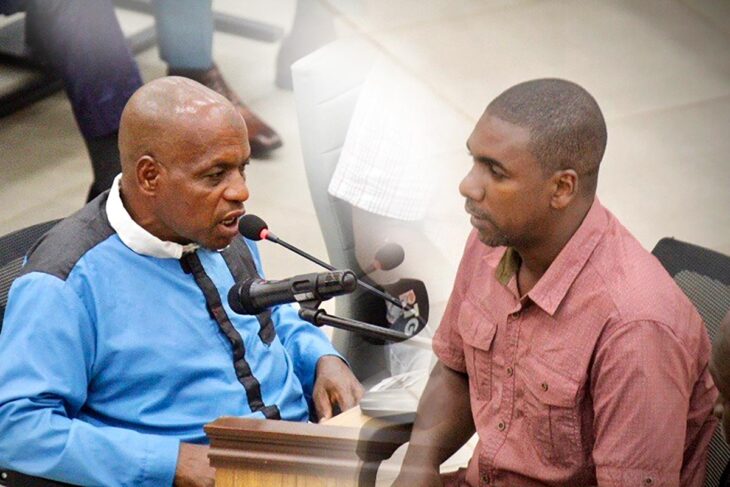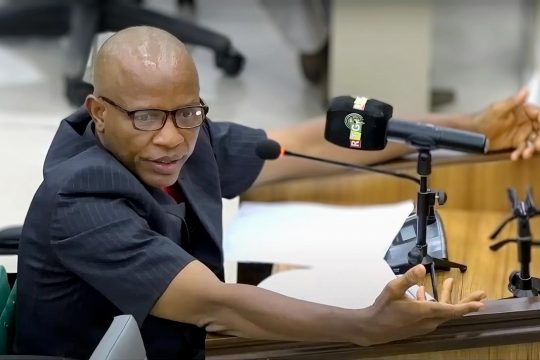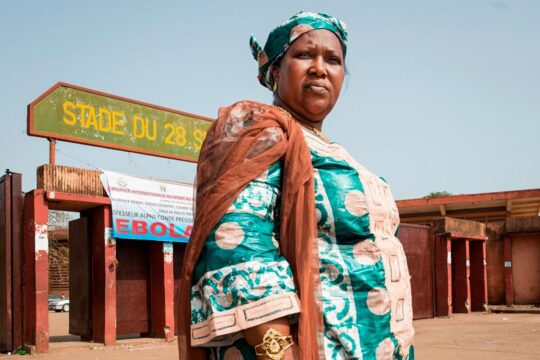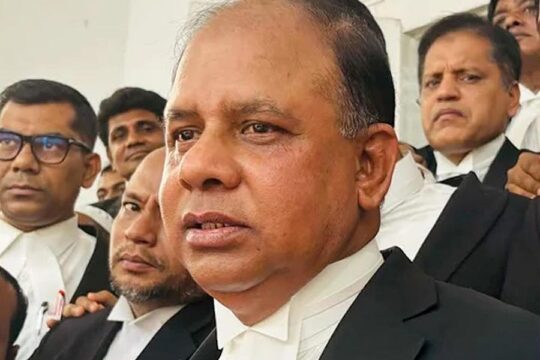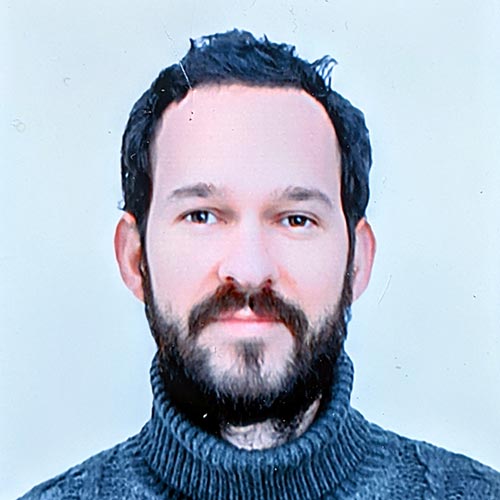The mega-trial of the Conakry stadium massacre has held Guinea in suspense for nearly eight months. It has seen the 11 defendants take the stand, and since February the victims, whose testimonies now allow us to understand that the abuses continued in detention several days after that fateful date of September 28, 2009.
On Tuesday May 16, Yagouba Barry was called to the stand. This 60-year-old participated, 13 years ago, in the opposition rally at the stadium in Conakry. The opposition intended to denounce the probable presidential candidacy of junta leader Moussa Dadis Camara, now sitting in the dock. With a closed face, Barry recounted the arrival of the soldiers, the first warning shots, his attempt to flee, and then the stab wounds to his neck and jaw. He lost consciousness. When he woke up, he realized that he had been taken to Camp Alpha Yaya Diallo, the main military camp on the outskirts of the capital. His foot was fractured and he had lost several teeth.
But his detention continued at the home of Moussa Tiegboro Camara, then Secretary of State for the fight against drugs and organized crime. The place was swarming with anti-drug agents. Some insulted him: "You are Cellou's dog [Cellou Dalein Diallo, leader of an opposition party]!” one of them shouted at him. Barry is sure that while there, he crossed paths with Tiegboro on several occasions. His release came after 12 days: "A red beret [many soldiers wore red berets at the time, the victim did not specify the corps in question] came, he asked 'this one, what happened to him?' He said that the whites were coming for an international commission of inquiry and that I had to be removed from there." Barry was released at nightfall. He was convinced that the military hierarchy must have known about this place of detention.
This long ordeal is similar to the story of another victim who came to testify a few days earlier, on May 9. Abdoulaye Diallo is almost 40 years old but his face is still youthful. At the stadium, he was arrested by the military. "They sent us to Camp Koundara [at the end of the Conakry peninsula, near the port of Boulbinet]. They made us go upstairs. We stayed there from Monday to Saturday morning. We couldn't find food, they made us go downstairs to beat us, they poured hot water on us, they climbed on top of us." His presentation lasted barely two minutes. Behind the microphone, Diallo remained calm. Tactfully, the prosecutor asked him to detail the mistreatment he had suffered: "Mr. Diallo, you were the victim of assault and battery at Camp Koundara, can you explain to the court how it was done? Diallo repeated what he has just said, adding a few things: "They gave us about 50 blows each time. They asked us to fight each other." The detainees were also exposed to the sun, around a pole, in the camp courtyard.
Witness points to Paul Mansa Guilavogui
This physical violence was accompanied by threats. "While hitting us, they told us they were going to kill us," said Diallo, who later added: "The red berets insulted us, some said they were going to defenestrate us. They were doing this because we had gone to the demonstration, that's how they justified themselves.”
In the military camp of Koundara, the prisoners were "numerous". “In the room where we were sent, there were already people locked up there," said Diallo. Officers ensured that the torture went smoothly, he said. In Koundara, he says he met Chief Warrant Officer Mohamed Camara, known as Begré, the camp commander, and a certain "Sergeant Paul. "Sergeant Paul, is this the person who is here?" the deputy prosecutor asked, looking towards the dock. Diallo nodded. He accused Paul Mansa Guilavogui of participating in the torture and described him as "very violent". "What did he do to you personally?” asked the deputy. "He participated in the beatings. He even came at night to do it. He also spilled hot water on us. He was the one who troubled us the most!" The military man at whom he pointed slept at the time in a room overlooking the room where about 20 protesters were being held, Diallo recounts.
This version is the opposite of Guilavogui’s. That defendant is being prosecuted for torture. Last February, Guilavogui acknowledged in court that people were sent to Camp Koundara, but minimized his role, presenting himself as a "simple subordinate”, just a guard. He did, however, accuse Begré: "He inflicted torture. He did things there. It was not my will, but what could I do?" Begré cannot be heard by the court, as he died in December 2009. Suspected of having participated in an assassination attempt on former junta leader Dadis Camara, he was arrested and executed by the military.
Diallo continued his story. For three days from September 28, Monday to Wednesday, he and his fellow prisoners were deprived of food. "Didn't Paul Mansa Guilavogui care to give you anything so that you would not die?” he was asked. “No, he didn't,” came the reply. “It was a small military man who came to find us to see if we had eaten. He informed one of his chiefs. Starting at 2 p.m. on Wednesday, we were given rations."
Lawless places
During his detention, Diallo was injured in the back. Now he is asking the court "to judge and convict" those responsible for the harm he suffered. He thinks the country's highest authorities, led by the president of the transition, were aware of what was happening in the military camps. Dadis Camara and his ten co-defendants, who have been appearing since September 28, 2022 before the Dixinn criminal court, are being prosecuted for alleged acts of torture, kidnapping, unlawful detention, failure to assist persons in danger, and complicity in these offences.
In these lawless places, the military also allegedly locked up women. In total, more than 100 women were raped on September 28, 2009 and in the days that followed. One of them testified before the court and gave a description of the building in Koundara, saying rapes took place there, the deputy prosecutor recalled. But Diallo did not see any women.
“You didn't witness this, you didn't hear their cries for help?" asked the prosecutor.
“No, I didn't hear that," Diallo replied soberly.


